Hyundai IONIQ 5 vs VW ID.5 - Differences and prices compared
Costs and Efficiency:
Price and efficiency are key factors when choosing a car – and this is often where the real differences emerge.
VW ID.5 has a minimal advantage in terms of price – it starts at 36800 £, while the Hyundai IONIQ 5 costs 38500 £. That’s a price difference of around 1654 £.
In terms of energy consumption, the advantage goes to the Hyundai IONIQ 5: with 15.60 kWh per 100 km, it’s minimal more efficient than the VW ID.5 with 15.70 kWh. That’s a difference of about 0.10 kWh.
As for range, the Hyundai IONIQ 5 performs hardly perceptible better – achieving up to 570 km, about 11 km more than the VW ID.5.
Engine and Performance:
Power, torque and acceleration say a lot about how a car feels on the road. This is where you see which model delivers more driving dynamics.
When it comes to engine power, the Hyundai IONIQ 5 has a decisively edge – offering 650 HP compared to 340 HP. That’s roughly 310 HP more horsepower.
In acceleration from 0 to 100 km/h, the Hyundai IONIQ 5 is decisively quicker – completing the sprint in 3.50 s, while the VW ID.5 takes 5.40 s. That’s about 1.90 s faster.
In terms of top speed, the Hyundai IONIQ 5 performs clearly perceptible better – reaching 260 km/h, while the VW ID.5 tops out at 180 km/h. The difference is around 80 km/h.
There’s also a difference in torque: Hyundai IONIQ 5 pulls a bit stronger with 770 Nm compared to 679 Nm. That’s about 91 Nm difference.
Space and Everyday Use:
Cabin size, boot volume and payload all play a role in everyday practicality. Here, comfort and flexibility make the difference.
Seats: offers more seating capacity – vs .
In curb weight, Hyundai IONIQ 5 is barely noticeable lighter – 1955 kg compared to 1963 kg. The difference is around 8 kg.
In terms of boot space, the VW ID.5 offers hardly perceptible more room – 549 L compared to 520 L. That’s a difference of about 29 L.
In maximum load capacity, the Hyundai IONIQ 5 performs hardly perceptible better – up to 1580 L, which is about 19 L more than the VW ID.5.
When it comes to payload, VW ID.5 hardly perceptible takes the win – 549 kg compared to 530 kg. That’s a difference of about 19 kg.
Who wins the race?
The Hyundai IONIQ 5 proves to be leaves the rival little chance and therefore becomes our DriveDuel Champion!
Hyundai IONIQ 5 is the better all-rounder in this comparison.
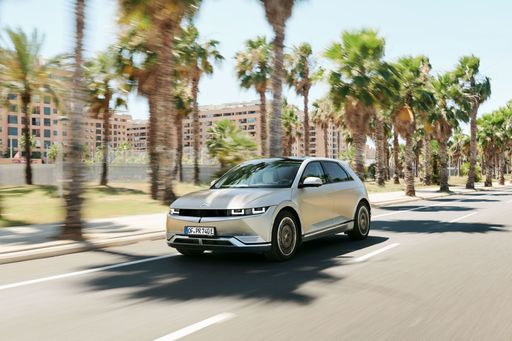 @ Hyundai Motor Company
@ Hyundai Motor Company
Hyundai IONIQ 5
Costs and Consumption
View detailed analysis
Engine and Performance
View detailed analysis
Dimensions and Body
View detailed analysis
Hyundai IONIQ 5
The Hyundai IONIQ 5 looks like a spaceship that moved into suburbia, pairing bold retro‑futuristic styling with a roomy, cleverly laid-out cabin that makes long trips surprisingly comfortable. Its electric character delivers instant, silky acceleration and low running costs, making it a smart, slightly cheeky pick for buyers who want tech, practicality and personality without the drama.
details @ Hyundai Motor Company
@ Hyundai Motor Company
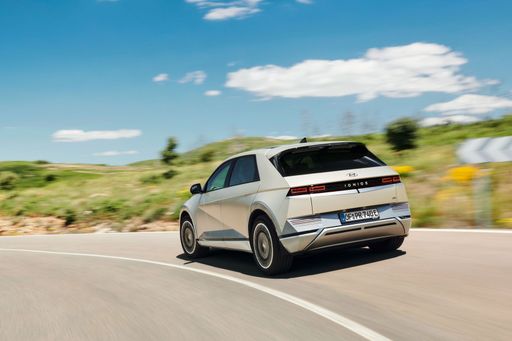 @ Hyundai Motor Company
@ Hyundai Motor Company
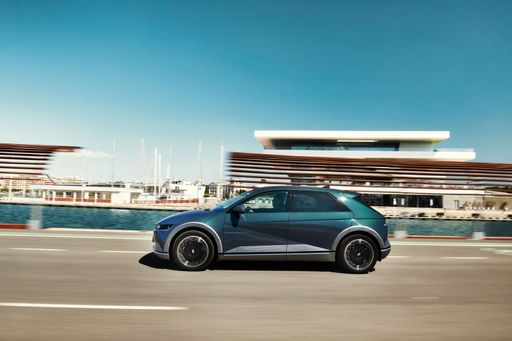 @ Hyundai Motor Company
@ Hyundai Motor Company
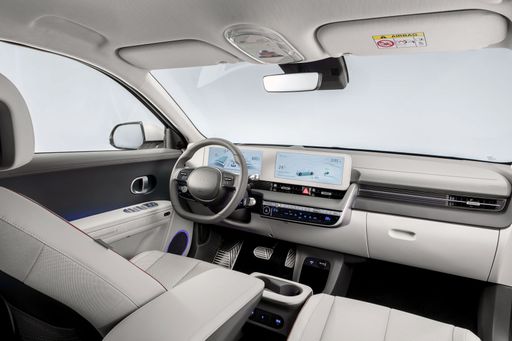 @ Hyundai Motor Company
@ Hyundai Motor Company
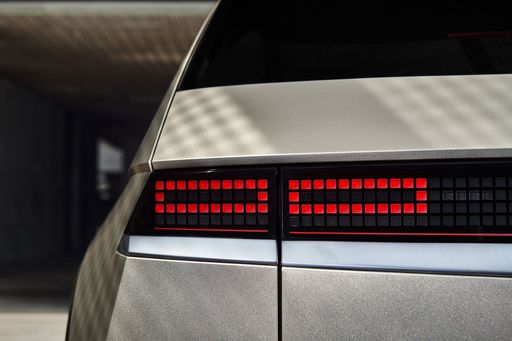 @ Hyundai Motor Company
@ Hyundai Motor Company
VW ID.5
VW ID.5 dresses electric power in a sleek, coupe-like profile that turns sensible motoring into something a touch more stylish and smug. Inside it’s spacious and user-friendly, with calm, confidence-inspiring driving that suits buyers who want EV simplicity without the sci‑fi theatrics.
details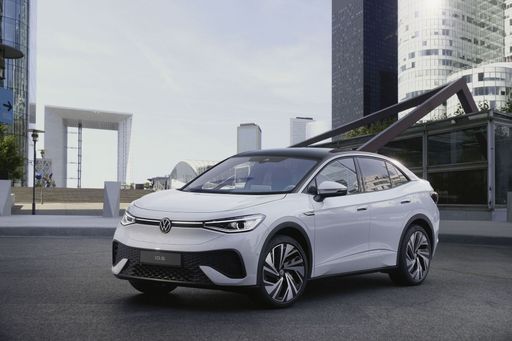 @ Volkswagen AG / VW Media
@ Volkswagen AG / VW Media
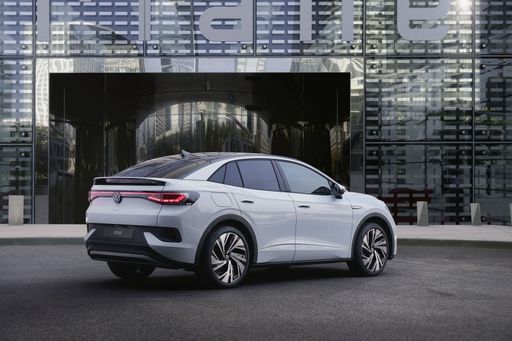 @ Volkswagen AG / VW Media
@ Volkswagen AG / VW Media
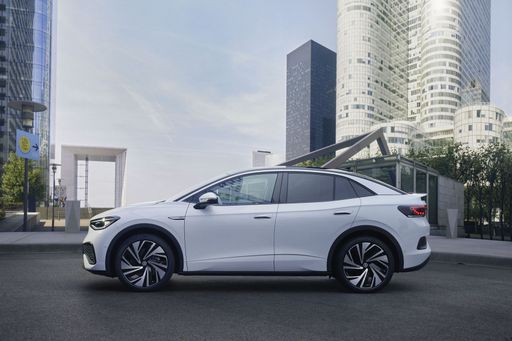 @ Volkswagen AG / VW Media
@ Volkswagen AG / VW Media
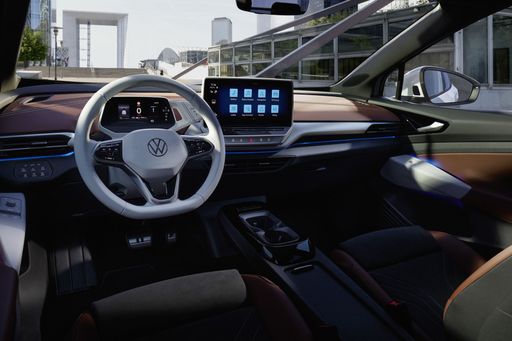 @ Volkswagen AG / VW Media
@ Volkswagen AG / VW Media
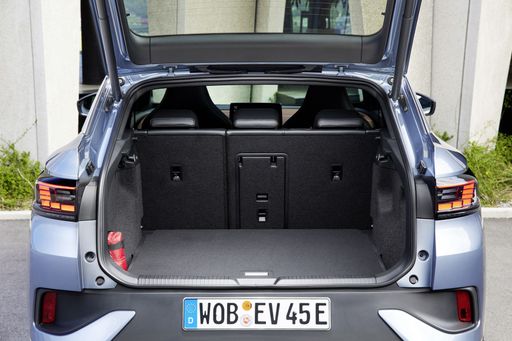 @ Volkswagen AG / VW Media
@ Volkswagen AG / VW Media
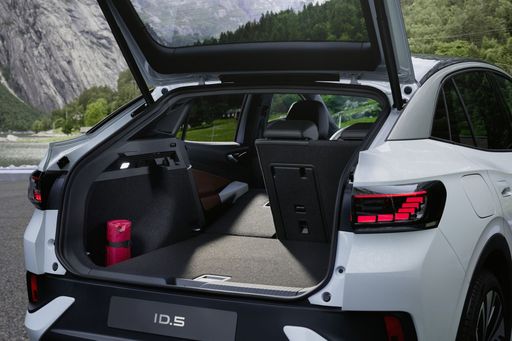 @ Volkswagen AG / VW Media
@ Volkswagen AG / VW Media
 @ Hyundai Motor Company
@ Hyundai Motor Company
|
 @ Volkswagen AG / VW Media
@ Volkswagen AG / VW Media
|
|
|
|
Costs and Consumption |
|
|---|---|
|
Price
38500 - 64200 £
|
Price
36800 - 48400 £
|
|
Consumption L/100km
-
|
Consumption L/100km
-
|
|
Consumption kWh/100km
15.6 - 21.2 kWh
|
Consumption kWh/100km
15.7 - 16.6 kWh
|
|
Electric Range
440 - 570 km
|
Electric Range
363 - 559 km
|
|
Battery Capacity
63 - 84 kWh
|
Battery Capacity
52 - 79 kWh
|
|
co2
0 g/km
|
co2
0 g/km
|
|
Fuel tank capacity
-
|
Fuel tank capacity
-
|
Dimensions and Body |
|
|---|---|
|
Body Type
SUV
|
Body Type
SUV
|
|
Seats
5
|
Seats
5
|
|
Doors
5
|
Doors
5
|
|
Curb weight
1955 - 2275 kg
|
Curb weight
1963 - 2233 kg
|
|
Trunk capacity
480 - 520 L
|
Trunk capacity
549 L
|
|
Length
4655 - 4715 mm
|
Length
4582 - 4599 mm
|
|
Width
1890 - 1940 mm
|
Width
1852 mm
|
|
Height
1585 - 1605 mm
|
Height
1601 - 1618 mm
|
|
Max trunk capacity
1540 - 1580 L
|
Max trunk capacity
1561 L
|
|
Payload
385 - 530 kg
|
Payload
517 - 549 kg
|
Engine and Performance |
|
|---|---|
|
Engine Type
Electric
|
Engine Type
Electric
|
|
Transmission
Automatic
|
Transmission
Automatic
|
|
Transmission Detail
Reduction Gearbox
|
Transmission Detail
Reduction Gearbox
|
|
Drive Type
Rear-Wheel Drive, All-Wheel Drive
|
Drive Type
Rear-Wheel Drive, All-Wheel Drive
|
|
Power HP
170 - 650 HP
|
Power HP
170 - 340 HP
|
|
Acceleration 0-100km/h
3.5 - 8.5 s
|
Acceleration 0-100km/h
5.4 - 8.9 s
|
|
Max Speed
185 - 260 km/h
|
Max Speed
160 - 180 km/h
|
|
Torque
350 - 770 Nm
|
Torque
310 - 679 Nm
|
|
Number of Cylinders
-
|
Number of Cylinders
-
|
|
Power kW
125 - 478 kW
|
Power kW
125 - 250 kW
|
|
Engine capacity
-
|
Engine capacity
-
|
General |
|
|---|---|
|
Model Year
2024 - 2025
|
Model Year
2024 - 2025
|
|
CO2 Efficiency Class
A
|
CO2 Efficiency Class
A
|
|
Brand
Hyundai
|
Brand
VW
|
What drive types are available for the Hyundai IONIQ 5?
The Hyundai IONIQ 5 is available as Rear-Wheel Drive or All-Wheel Drive.
The prices and data displayed are estimates based on German list prices and may vary by country. This information is not legally binding.
